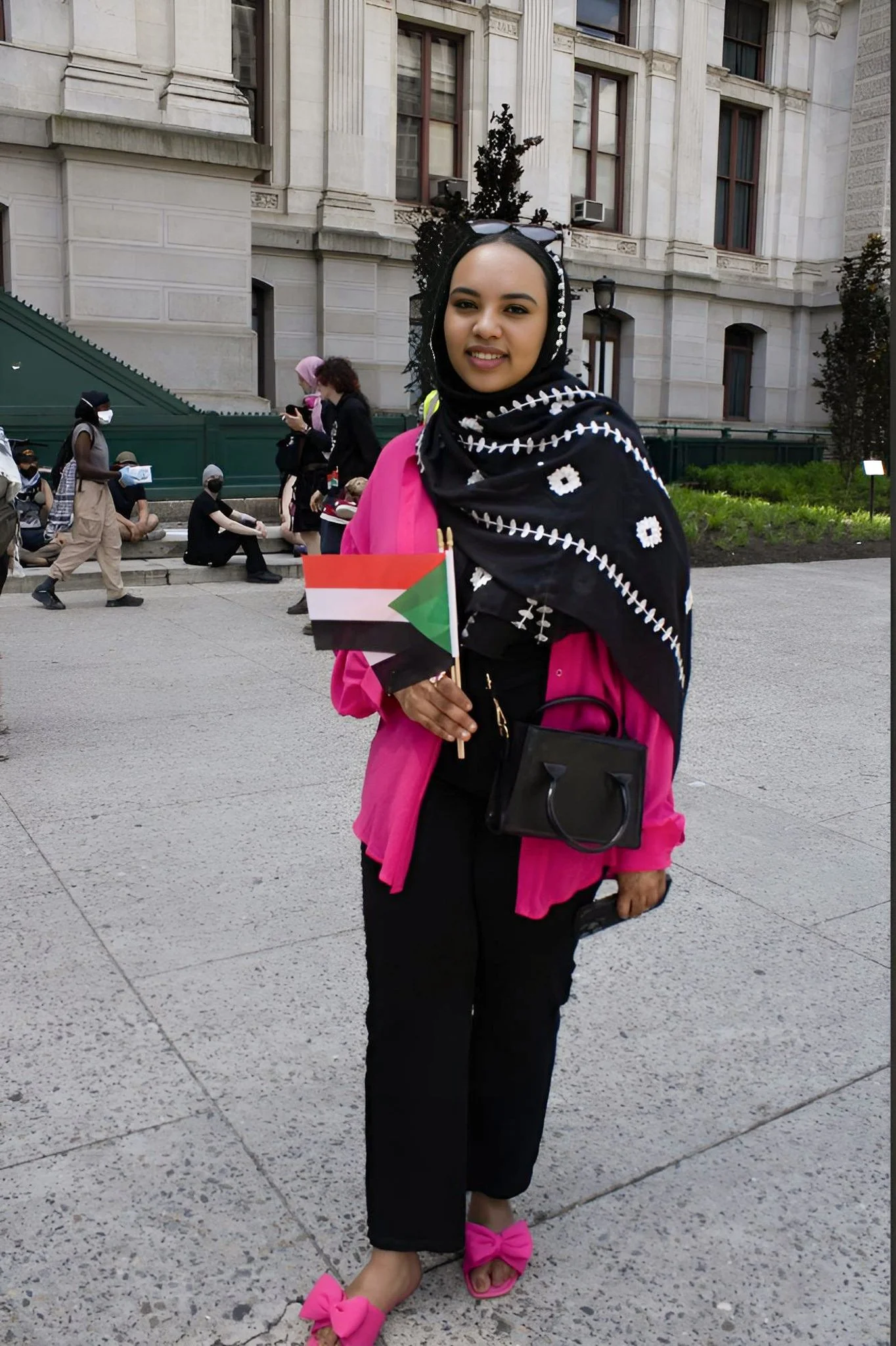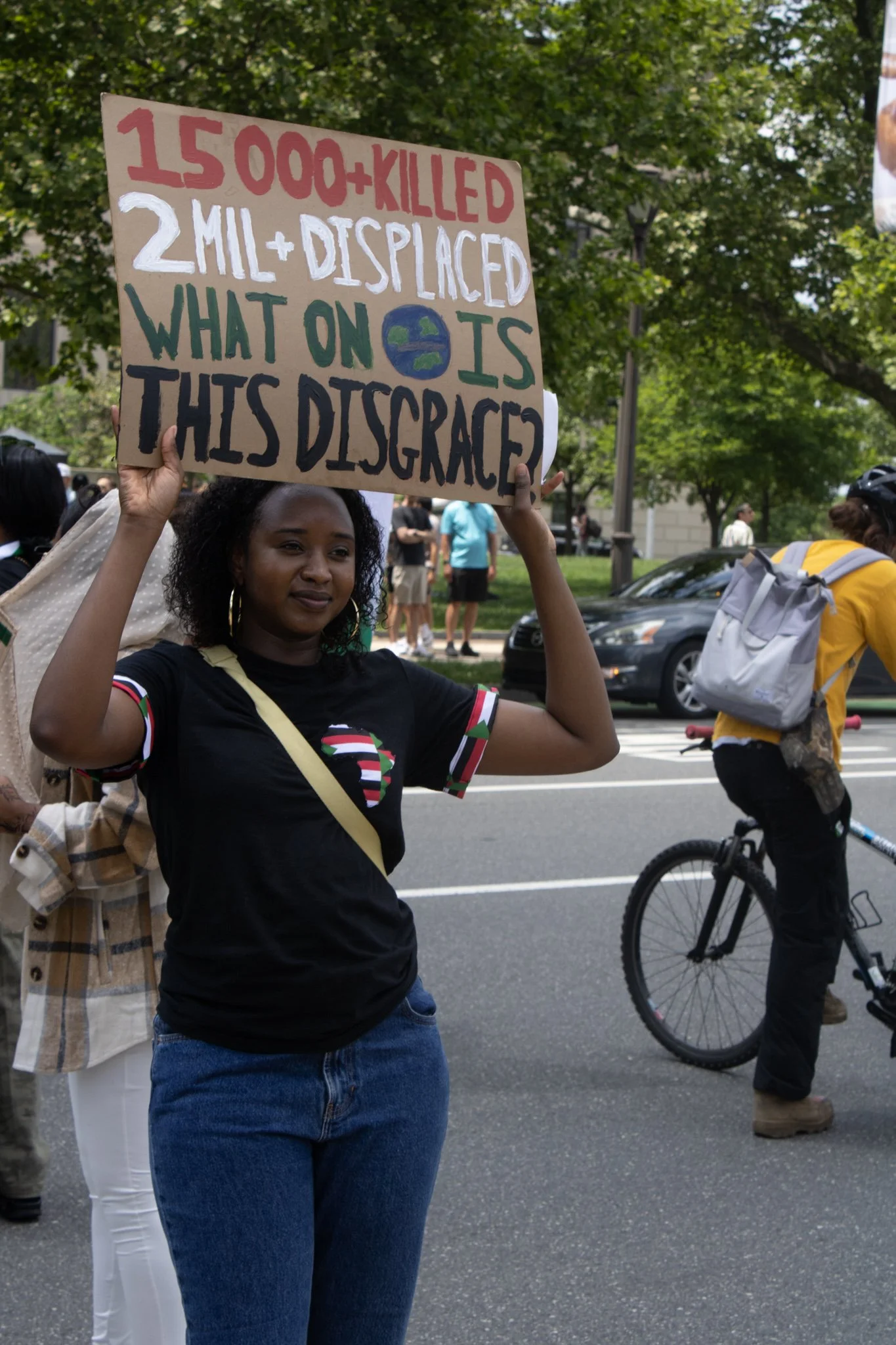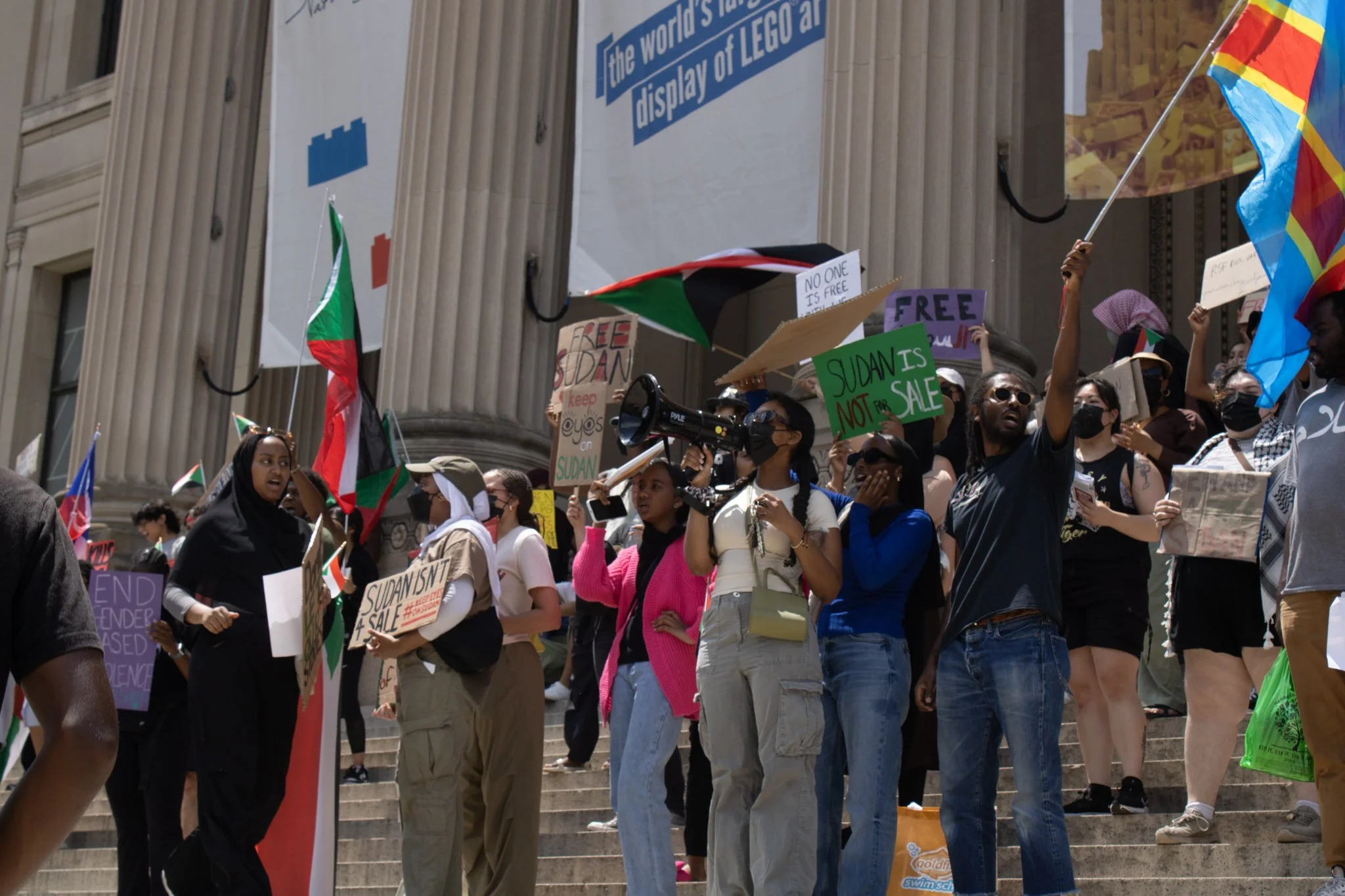Hundreds March for Sudan in Dilworth Park, Insisting 'This is Not a Civil War'
Lauren Abunassar
As violence between the Sudanese Armed Forces (SAF) and the Rapid Support Forces (RSF) escalates, Philadelphia’s Sudanese diaspora is speaking out in support of Sudan—calling for liberation, increased humanitarian aid, and increased attention to the crisis. Last month, hundreds gathered for a rally and march that started at Dilworth Park, sharing stories emerging from Sudan, where famine and displacement is worsening.
Philadelphia’s Sudanese diaspora spoke out in support of Sudan at a May 26 rally and march. Photo credit: Lauren Abunassar.
Last month’s rally for Sudan at Dilworth Park was organized by Philly for Sudan. Photo credit: Lauren Abunassar
Speakers at the May 26 event, which was organized by the newly founded advocacy network Philly for Sudan, described their increasing frustration with the media and the Western world for dangerously mislabeling Sudan’s crisis a ‘civil war.’ Many organizers and attendees would only speak to Al-Bustan on terms of anonymity out of concern for the safety of their family members still in Sudan.
“This is not a conflict and it’s not a civil war,” said one of the event’s speakers, Kimari (last name withheld), in an interview with Al-Bustan. “I get frustrated when people call it ‘a conflict.’ It’s a proxy war and a genocide and the lack of attention all comes down to anti-Blackness.” Kimari traveled to Philadelphia from NYC with a group of pro-Palestine activist friends eager to express their understanding of occupation and genocide and their solidarity in the fight for liberation.
For Kimari and other marchers, linguistics is an underexamined part of the fight for liberation. Many marchers lamented the way errantly labeling the violence a ‘civil war’ can be seen as an extension of failed international accountability. After all, the more the international community perpetuates an image of regional infighting, the easier it is to ignore the role they have played in fueling the ongoing crisis.
Though Sudan’s two rival generals, SAF leader Abdel Fattah al-Burhan and RSF leader Mohamed Hamdan Dagal (known as “Hemedti”), have helmed the ongoing violence, the fighting transcends domestic politics. Sudan functions as a crucial link between the Middle East and Africa. It’s also replete with natural resources: oil, iron ore, uranium, gypsum, mica, chromite, and gold reserves.
Sudan is now torn between Saudi Arabia and the United Arab Emirates (UAE) in a battle for these resources and, as a result, accompanying regional dominance. Saudi Arabia has offered its support to al-Burhan, while the UAE has backed Hemedti.
Hundreds marched from City Hall to Logan Square to bring attention to the crisis in Sudan where famine and displacement is worsening. Photo credit: Lauren Abunassar
Both Saudi Arabia and the UAE have economic ties to Sudan. In 2022, Saudi Arabia announced its intentions to invest $24 billion towards Sudanese agriculture, infrastructure, real estate, mining, healthcare, manufacturing, and technology, as reported by the Sudan Tribune. Meanwhile, in 2022, the UAE and Sudan signed a $6 billion deal to develop a new port in the Red Sea.
If fighting continues to divide Sudan, the UAE will have a foothold of power in RSF-controlled regions. It will also have greater standing in the region, fueling the extension of Saudi Arabia and UAE’s rivalry into Africa.
Meanwhile, for many Sudanese, the media’s lack of acknowledgment of these external forces and interests is as disappointing as it is unsurprising.
“We’re used to the lack of attention,” said a march organizer, Israh (last name withheld), in an interview with Al-Bustan, adding, “Growing up, no one knew what Sudan was.” Israh grew up in Philadelphia, but saw her family house in Khartoum destroyed at the beginning of the war. She has been anxiously doing what she can to both follow developments in Sudan while mobilizing community here in Philadelphia. In Sudan, her family’s neighbor was executed by the RSF on his way to shelter with Israh’s family. She knows countless others who have fled in what she calls ‘the worst circumstances imaginable.’
At the march, Israh's young cousin (name withheld) told Al-Bustan she attended the pre-rally art build held days earlier at the Philadelphia Sudanese American Community Center in Cobbs Creek. Having grown up in Sudan, she says, she is still reconciling with the long journey she and her family took to escape. They took a four-day long bus ride and a 12-hour train ride in order to get to Egypt, all before embarking on another long journey to the United States. “In Sudan, something is always happening. So, we thought this would be over soon and we’d be going back,” she said. “When they started calling it a war, it felt different.” Today, she’s unsure if she has any hope of being able to one day return to her home.
“15,000+ killed. 2 million+ displaced,” read a homemade placard held up by a protester in Philadelphia, drawing attention to the violence unfolding in Sudan. Photo credit: Lauren Abunassar
Another march organizer, University of Pennsylvania student, Dalia (last name withheld), echoed the feelings of uncertainty and mourning for the Sudan she remembers. Today, in Sudan’s al-Jazirah state, where Dalia’s paternal family still live, people are burying their cars in an effort to hide them from the RSF so they won’t be looted for their engines and tires. When Dalia is able to get in touch with family, she hears the sounds of destruction and bombing in the background. “Black struggle, globally, is muted,” Dalia told Al-Bustan of the lack of attention from the West regarding the ongoing suffering. “The West profits off Black bodies and Black suffering.” Above all, Dalia notes, it’s important to acknowledge that this is not a civil war. It’s a genocide. And, according to Dutch think-tank, the Clingendael Institute, it’s one that could lead to 2.5 million deaths from hunger by September 2024, all on top of the over 15,000 reported killings so far.
At the art build, both Dalia and Israh reflected on their last visits to Sudan in 2017 and 2021, respectively. Dalia remembers the collective happiness and mutual aid, something that has no doubt helped people survive even as the killing and the bombings rage on. Israh, meanwhile, remembers the nights when her family dragged their mattresses into the garden to look up at the stars. There is hope for a return to these moments of gathering, but there is also a deep mourning for it.
Other march attendees were similarly insistent that the needs of Sudanese not be continuously buried or ignored. Azah (last name withheld) moved to the U.S. from Khartoum six years ago. This past year, she’s had to come to terms with the fact that the family house in which she grew up has been used by the military for shelter, vandalized, robbed. Sudanese American Methany Tigani spoke to the crowd about wearing a Darfur shirt to the march. She first got the shirt when protesting that genocide, which broke out in 2003. She expressed a bittersweet surprise that the shirt still fit, that the genocide still goes on.
Speakers at the May 26 march called for liberation, increased humanitarian aid, and increased attention to the crisis in Sudan. Photo credit: Lauren Abunassar
Similarly, a representative from Montgomery County for Palestine, an advocacy organization for peace, equity, and liberation, attended the march to participate in intercultural allyship. Naz (last name withheld) spoke of attending a march for Palestine the day before. Her own family is from Bangladesh. “You don’t have to be from Palestine or from Sudan to show up and fight for change,” she told Al-Bustan, adding “We understand oppression. People who are oppressed would never oppress someone else.”
Altogether, the deep sense of kinship and community aid linking the diverse crowd of activists is perhaps best summarized by a line from “Ode to Sudanese-Americans,” a poem by Sudanese-American Safia Elhillo: “And it’s true,” a marcher read the line to the crowd as they walked from City Hall to Logan Square, “my people are everywhere.”
***
Lauren Abunassar is a Palestinian-American writer and journalist. A Media Fellow at Al-Bustan, she holds an MFA from the Iowa Writers’ Workshop and an MA in journalism from NYU. Her first book Coriolis was published by University of Arkansas Press as winner of the 2023 Etel Adnan Poetry Prize.





